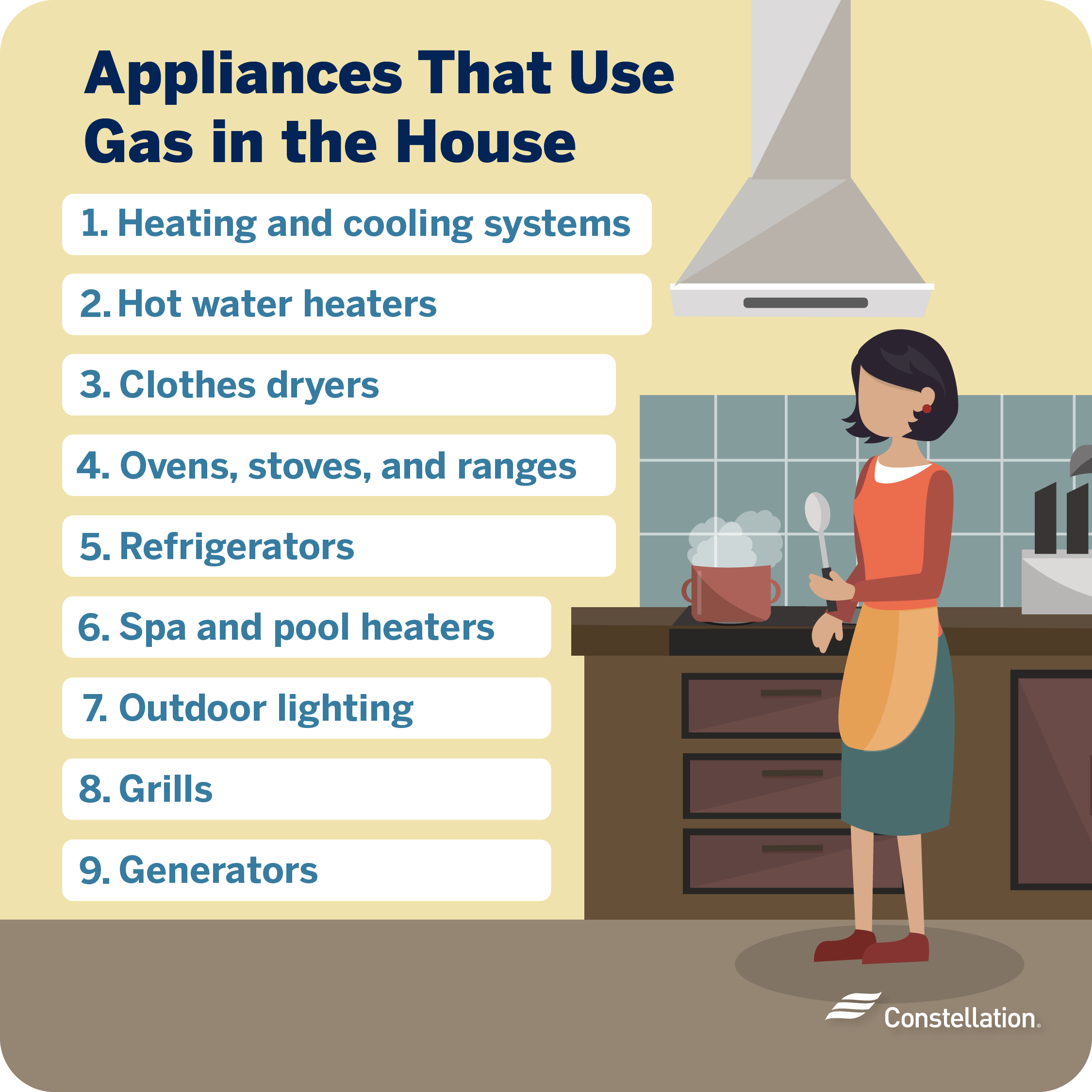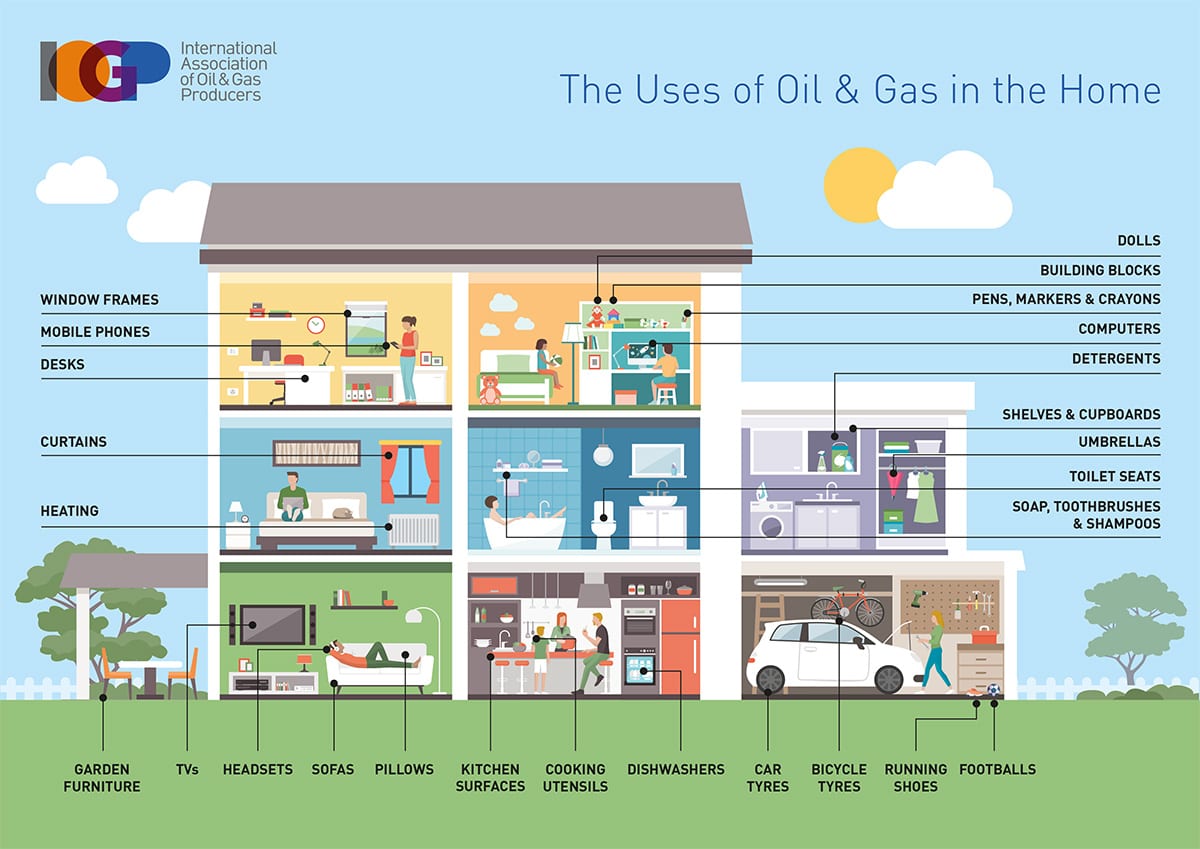What Uses Gas in a House?: Slash Bills & Boost Efficiency
In a house, gas is used for cooking, heating, water heating, and drying clothes. Gas powers cooktops, ovens, ranges, stoves, air conditioning, water heaters, and clothes dryers.
It is a versatile energy source that keeps our homes comfortable and functional. Gas appliances like fireplaces and pool heaters also contribute to the various uses of gas in a household. Understanding the different applications of gas in a house helps homeowners appreciate the convenience and efficiency it provides.
However, managing gas usage wisely is essential for safety, cost-effectiveness, and environmental sustainability. Let’s explore the diverse ways gas is utilized in homes and how to optimize its usage for maximum benefit.
Introduction To Residential Gas Usage
Residential gas usage in a house includes cooking on stoves, drying laundry with dryers, heating water, and powering fireplaces. Gas is commonly used for cooking, heating, and hot water systems in many households. Appliances such as stoves, water heaters, and furnaces are typical gas consumers in a home.
Typical Gas-powered Appliances
Gas is an essential resource used in residential buildings for various purposes. From cooking to heating, it is used in almost every aspect of a house. Here, we will discuss some of the typical gas-powered appliances found in homes.Primary Functions Of Natural Gas
Natural gas is a clean, efficient, and cost-effective source of energy used in residential buildings. The primary functions of natural gas in homes include heating, cooking, and producing hot water. It is also used for drying clothes, lighting, and fueling fireplaces.Cooking
Cooking is one of the most common uses of natural gas in homes. Gas-powered cooktops, ovens, ranges, stoves, and grills provide instant heat and precise temperature control. They are also more efficient than electric appliances, resulting in lower energy bills.Heating
Natural gas is used to heat homes in cold weather. Gas furnaces and boilers are more efficient than electric heating systems, providing comfortable warmth to homes. Gas fireplaces are also popular, providing an ambiance that electric fireplaces cannot match.Water Heating
Natural gas is used to heat water for household needs, such as showering, cleaning, and washing dishes. Gas water heaters are efficient, reliable, and cost-effective, providing hot water on-demand.Clothes Drying
Gas dryers are more efficient than electric dryers, saving time and money on energy bills. They dry clothes faster and produce less static electricity, resulting in less wear and tear on clothes. In conclusion, natural gas is a versatile resource used in many aspects of residential buildings. It is clean, efficient, and cost-effective, providing comfort and convenience to homes.Heating Your Home
Central Heating Systems
Central heating systems are vital in keeping your home warm and comfortable during colder months.
Water Heaters
Water heaters play a crucial role in providing hot water for showers, dishes, and laundry.
Kitchen Appliances
When it comes to gas usage in a house, kitchen appliances are among the top consumers. From cooking to baking, gas plays a vital role in powering various kitchen appliances. Let’s delve into the specifics of these gas-powered kitchen essentials.
Gas Stoves And Ovens
Gas stoves and ovens are indispensable components of a functional kitchen. They provide efficient heat for cooking and baking, making meal preparation convenient and enjoyable. The steady flame of a gas stove offers precise temperature control, allowing for versatile cooking techniques.
Advantages Of Cooking With Gas
Cooking with gas offers several advantages that make it a preferred choice for many households. The immediate and consistent heat provided by gas stoves allows for quick meal preparation, saving valuable time in the kitchen. Additionally, the visual flame of a gas stove provides a clear indication of the heat level, aiding in the cooking process.
Laundry Equipment
Laundry equipment is an essential part of any household, providing the convenience of keeping clothes clean and fresh. When it comes to the energy source for laundry equipment, gas-powered options are popular for their efficiency and cost-effectiveness.
Gas Dryers
Gas dryers are a common choice for many households, offering a reliable and efficient way to dry clothes. Unlike electric dryers, gas dryers utilize natural gas to generate heat, which speeds up the drying process and can save on energy costs.
When comparing gas dryers to electric ones, it’s important to consider the operating costs and efficiency. Gas dryers tend to be more energy-efficient and can often dry clothes faster than electric dryers. Additionally, natural gas is often more affordable than electricity, resulting in potential cost savings over time.
Water Heating Solutions
Water heating is a significant energy expense in many households. Fortunately, there are various water heating solutions available to improve efficiency and reduce gas consumption.
Tankless Water Heaters
Tankless water heaters, also known as on-demand water heaters, only heat water when needed, eliminating the energy losses associated with traditional water heaters that continuously heat and reheat water in a storage tank. This results in lower energy consumption and reduced gas usage.
Storage Water Heater Efficiency
When it comes to storage water heaters, upgrading to a more efficient model can lead to substantial gas savings. Newer storage water heaters are designed with improved insulation, reduced standby heat loss, and advanced heating elements, all of which contribute to enhanced efficiency and decreased gas usage.
Outdoor And Leisure Gas Usage
When it comes to outdoor and leisure activities, many homeowners rely on gas to power various appliances. From heating pool water to grilling up delicious meals, gas plays a crucial role in enhancing leisure time at home.
Pool Heaters
Pool heaters offer the luxury of extending the swimming season, allowing families to enjoy their pool for a longer duration. These gas-powered heaters efficiently warm the water, enabling a comfortable and enjoyable swimming experience even during cooler weather conditions.
Outdoor Grills
Outdoor grills are a staple for social gatherings and family cookouts. Gas grills provide a convenient and efficient way to barbecue, offering consistent heat for perfectly grilled dishes without the hassle of charcoal preparation.
Slash Bills With Efficient Practices
Insulation And Energy Loss
Proper insulation helps reduce energy loss in your home, leading to lower gas bills. Insulate walls, attics, and floors to maintain a consistent temperature.
Maintenance Tips For Gas Appliances
- Regularly service gas appliances to ensure they operate efficiently.
- Check for leaks in gas lines and connections.
- Clean or replace filters in gas appliances for optimal performance.
- Keep vents and flues clear of debris to prevent blockages.
By following these maintenance tips, you can improve the efficiency of your gas appliances and save on energy costs.

Credit: blog.constellation.com
Alternative Energy Sources
Gas in a house is commonly used for cooking, heating water, drying clothes, and running fireplaces. Appliances like cooktops, water heaters, and dryers rely on gas as an energy source. Efficient use of gas in these household activities is crucial for energy conservation.
Alternative Energy Sources As concerns about the environment grow, more and more people are looking to alternative energy sources to power their homes. One of the most popular options is renewable energy, which includes solar, wind, and hydropower. These sources of energy are sustainable and have a lower impact on the environment than traditional fossil fuels. Electric vs. Gas Appliances When it comes to appliances, there are two main options: electric and gas. Electric appliances are powered by electricity, while gas appliances use natural gas. While both have their advantages and disadvantages, many people are choosing electric appliances because they are more energy-efficient and have a lower impact on the environment. Renewable Energy Options Renewable energy is becoming more accessible and affordable than ever before. Solar panels can be installed on rooftops, wind turbines can be installed on properties with enough space, and hydropower can be generated from nearby bodies of water. While the upfront cost of these systems can be high, they can save homeowners money in the long run by reducing their reliance on traditional energy sources. In addition to these renewable options, there are also energy-efficient appliances that can help reduce energy consumption in the home. Energy Star certified appliances are designed to use less energy than their non-certified counterparts, which can save homeowners money on their energy bills. Overall, there are many alternative energy sources available to homeowners looking to reduce their reliance on traditional fossil fuels. From renewable energy to energy-efficient appliances, there are many ways to reduce your carbon footprint and save money on your energy bills.Safety And Compliance
Ensuring safety and compliance with regulatory standards is paramount when it comes to the use of gas in a house. From gas appliances to the infrastructure, it is crucial to adhere to the prescribed safety measures and guidelines to prevent potential hazards and ensure the well-being of occupants.
Safety Measures For Gas Appliances
Gas appliances play a vital role in a household, but it is essential to implement specific safety measures to mitigate any potential risks. Regular maintenance and inspections, proper ventilation, and installation by certified professionals are key to ensuring the safe operation of gas appliances.
Understanding Regulatory Standards
Adhering to regulatory standards is critical for ensuring the safe use of gas in a house. From the installation of gas lines to the functioning of gas-operated appliances, compliance with local building codes and safety regulations is imperative. Understanding and adhering to these standards can help prevent accidents and maintain a safe living environment.

Credit: www.iogp.org
Future Of Home Gas Usage
The future of home gas usage is evolving rapidly with advancements in gas technology and the impact of energy policies.
Advancements In Gas Technology
Gas technology is continuously advancing to make home gas usage more efficient and sustainable. The development of smart gas meters allows for real-time monitoring of gas consumption, promoting better energy management.
Furthermore, the innovation of high-efficiency gas appliances, such as condensing boilers and tankless water heaters, reduces gas consumption while maintaining optimal performance.
Impact Of Energy Policies
Energy policies play a crucial role in shaping the future of home gas usage. Regulations promoting the use of renewable natural gas and incentivizing energy-efficient upgrades encourage homeowners to adopt greener gas solutions.
Moreover, energy policies focusing on reducing carbon emissions drive the transition towards cleaner gas alternatives, such as biogas and hydrogen, for a more sustainable home gas usage.

Credit: taraenergy.com
Frequently Asked Questions
What Typically Runs On Gas In A House?
Gas typically powers cooking appliances, water heaters, clothes dryers, fireplaces, stoves, heating systems, and pool heaters in a house.
Why Am I Using So Much Gas In My House?
You may be using a lot of gas due to frequent use of central heating, inefficient appliances, or poor insulation. Gas is used for heating, cooking, drying, and water heating in homes. HVAC systems, water heaters, and cooktops are the top gas-consuming appliances.
Regular maintenance and efficient usage can help reduce gas consumption.
Which Appliances Use The Most Gas?
Clothes dryers, air conditioning, fireplaces, stoves, water heaters, cooking appliances, pool heaters, and heating equipment are some of the appliances that use the most gas in a house. HVAC systems and water heaters alone account for about half of all annual energy costs.
To reduce your gas bill, you can invest in energy-efficient appliances, improve your home’s insulation, and limit usage of gas appliances.
What Is Gas In The House Used For?
Gas in the house is used for cooking, heating, water heating, cooling, drying laundry, and powering appliances like stoves.
Conclusion
Various appliances like stoves, water heaters, and dryers use gas in a house. Understanding gas usage helps in managing energy costs efficiently. Proper maintenance and insulation can help reduce gas consumption and save on bills. Stay informed to make informed choices for a more sustainable home.



